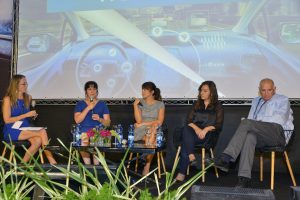
Israel has quickly established itself as one of the leading countries working on automated driving and the future of mobility. At the Autonomous Tech 2018 conference in Tele Aviv this commitment was on full display, bringing together a wide-ranging group of speakers and attendees to interact, learn, and share knowledge between Israel and the industry leaders from South Korea, the U.S., France, Germany, and around the world
According to the Israel Innovation Authority, some 500 companies in Israel are currently engaged in smart transportation fields, such as ride sharing, connected cars, electric vehicles and autonomous driving systems. The Israeli smart mobility sector reached $22 billion over the last five years, according to a report by Roland Berger.
“The technological and social challenges of automotive disruption have created a great opportunity for the entire industry,” Rutie Adar, head of Samsung Strategy and Innovation Center in Israel, said on stage during the panel “Autonomous Tech – from Investors Viewpoint”. Rutie was joined by Anat Bonshtien, Chairman and Director, Fuel Choices & Smart Mobility Initiative, Prime Minister’s Office; Michal Vakrat Wolkin, Head of Israel Office, Lear Corporation; Danielle Holtz, Director of business development, Maniv Mobility; and Yahal Zilka, managing partner, Magma Ventures.
“Automotive investments started with the basics, first investing in the best sensors and perception algorithms, then into compute to enable machine vision in the car,” Adar said. “Now, focus has shifted towards how safe the driving would be in order to enable wide adoption, and investments that go into simulation, validation, big data and protection.”
Connected cars generate a massive amount of data, ranging from driver behavior to navigation to traffic and beyond, Adar said. “This data is valuable and will enable new services, starting from user-based insurance, through fueling as a service, and all the way to smart cities. Investments will help enabling this emerging segments.”
According to Adar, in order to sell to the automotive OEMs and Tier 1 suppliers, startups need to develop automotive know-how that’s different from other tech industries. “Find either an advisor or a full-time person from the automotive industry to gain the required DNA,” Adar advised.
“More than 40 countries sent representatives to the conference and about 2,000 people took part in the conference,” said Bonshtien of the Prime Minister’s office. “The representatives of the major companies are basically Gate Openers for the Israeli startups.”
“Samsung believes that for true innovation to succeed we need to reach out to the best talents and work in collaboration,” Adar said. “In recent years we have invested in quite a few companies in the automotive domain and some of them here in Israel. Our mission is to facilitate fruitful collaboration between these companies and Samsung’s very diverse systems and product lines. We believe that One plus One always gives more than Two… Our Israeli team’s relationship with these young companies is beyond pure investment. We are assisting in the growth of the companies we invested in and we serve as a bridge between them and Samsung.”
“Samsung and its team in Israel are a good example of how to really work with startups,” said Holtz from Maniv Mobility. “Samsung knows how to promote innovation and Samsung’s local team is a very important link in the success of this connection.”